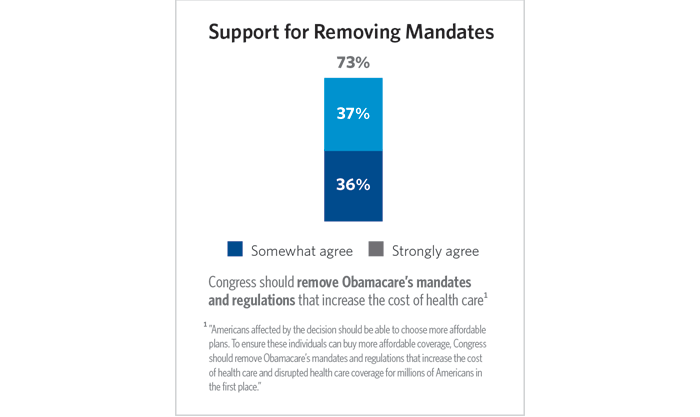KING V. BURWELL RESPONSES
More Support Reducing Mandates Than Extending Subsidies in Wake of Decision
When asked in recent research conducted under the American Perceptions Initiative what Congress should do if federal subsidies are struck down, a majority of Americans agreed with an approach that would reduce mandates and therefore costs for those affected (73% somewhat/strongly agreed).

REPEAL AND RECONCILIATION
Majority want Obamacare Repealed Through Reconciliation
Almost 6 in 10 agreed that Congress should use reconciliation now to repeal Obamacare and follow through on their promise to send a repeal bill to the president (58% somewhat/strongly agree). Focusing on the responsibility of Congress to do so plays on some negative feelings about the law—54% think the problems with the Obamacare rollout were just the beginning—and helps build support, as somewhat fewer voters would make the decision to repeal if it were up to them (51%).
Slightly fewer agreed to the broader alternative of using “every option possible to find a way to repeal Obamacare” (55%) than using reconciliation specifically. Even more (61%) agreed that it is completely appropriate to use the same process to repeal Obamacare that was used to pass it, indicating that some voters recognize reconciliation as a valid vehicle for repeal when couched in those terms even if they support Obamacare.
Messaging Tips
- Include a personal appeal—reference “Americans”, “individuals”, or “you”.
- Orient messages around cost.
- Highlight the law’s flaws and its impact on each individual American and tie those to proposed changes to the law.
- Tie repeal to themes above to boost support.
54% of voters believe the problems with the Obamacare rollout were just the beginning. People losing their doctors and being forced into higher cost plans make [me] believe the worst is yet to come.
Source: Online survey using a national representative sample of 1,014 U.S. voters conducted May 19–21, 2015 with a margin of error of ±3.1%.




